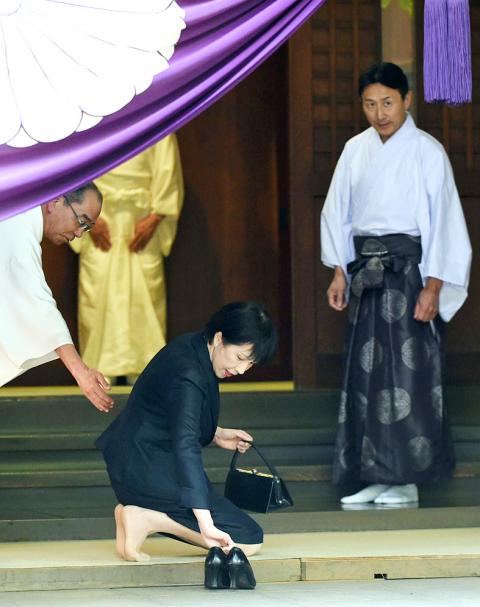Just hours after Japanese Prime Minister Shinzo Abe sat down for his first substantial talks with Chinese President Xi Jinping (習近平), three of his Cabinet ministers yesterday visited the war shrine that Beijing sees as a symbol of Tokyo’s violent past.
Visits by the three have the potential to muddy diplomatic waters that were starting to clear after their nationalist boss sat down with the Chinese president on the sidelines of a regional summit in Jakarta, Indonesia.
“I offered my sincere appreciation for the people who fought and sacrificed their precious lives for the sake of the country,” Japanese National Public Safety Commission Minister Eriko Yamatani told reporters after her pilgrimage.

Photo: AFP
“I pledged efforts for building a peaceful country,” said the minister, known for her strident nationalistic views.
She was followed over the next few hours by Haruko Arimura, state minister in charge of female empowerment, and Japanese Internal Affairs and Communication Minister Sanae Takaichi.
More than 100 Japanese lawmakers went to the shrine on Wednesday to coincide with its spring festival, even as officials were making final arrangements for the Xi-Abe meet.
Abe had asked his ministers not to visit before the talks happened, according to Jiji Press.
Xi and Abe held discussions in Jakarta for about 30 minutes, their first lengthy pow-wow since both men came to the helm of nations that are bitterly at odds over history and current territorial disputes.
Abe later told reporters that they had a “very meaningful summit meeting” and bilateral relations were improving.
In Tokyo yesterday, Japanese Chief Cabinet Secretary Yoshihide Suga, speaking after Yamatani’s pilgrimage, said it should have no bearing on warming China ties.
“I don’t think there will be [any impact]. The visit was made in a personal capacity,” Suga said.
Masaru Ikei, professor emeritus at Keio University and an expert on Japanese diplomatic history, said shrine visits like this were somewhat inevitable, but unlikely to be a disaster.
Taiwan expressed regret yesterday over the visit to the shrine.
Ministry of Foreign Affairs spokeswoman Anna Kao (高安) said the government regrets the visit by more than 100 Japanese lawmakers to the shrine a day earlier.
The shrine honors Imperial Japan’s war dead, including 30,304 Taiwanese. It is seen by many as a symbol of Japan’s wartime militarism.
Noting that this year marks the 70th anniversary of the end of World War II, Kao said the government urged Japanese politicians to look squarely at historical facts and reflect deeply upon themselves.
Kao called on Japan to refrain from actions that could hurt the feelings of the people in neighboring countries, and to develop friendly relations with other countries to promote regional peace and stability.

Auckland rang in 2026 with a downtown fireworks display launched from New Zealand’s tallest structure, Sky Tower, making it the first major city to greet the new year at a celebration dampened by rain, while crowds in Taipei braved the elements to watch Taipei 101’s display. South Pacific countries are the first to bid farewell to 2025. Clocks struck midnight in Auckland, with a population of 1.7 million, 18 hours before the famous ball was to drop in New York’s Times Square. The five-minute display involved 3,500 fireworks launched from the 240m Sky Tower. Smaller community events were canceled across New Zealand’s

The Ministry of Foreign Affairs (MOFA) yesterday said it is closely monitoring developments in Venezuela, and would continue to cooperate with democratic allies and work together for regional and global security, stability, and prosperity. The remarks came after the US on Saturday launched a series of airstrikes in Venezuela and kidnapped Venezuelan President Nicolas Maduro, who was later flown to New York along with his wife. The pair face US charges related to drug trafficking and alleged cooperation with gangs designated as terrorist organizations. Maduro has denied the allegations. The ministry said that it is closely monitoring the political and economic situation

‘SLICING METHOD’: In the event of a blockade, the China Coast Guard would intercept Taiwanese ships while its navy would seek to deter foreign intervention China’s military drills around Taiwan this week signaled potential strategies to cut the nation off from energy supplies and foreign military assistance, a US think tank report said. The Chinese People’s Liberation Army (PLA) conducted what it called “Justice Mission 2025” exercises from Monday to Tuesday in five maritime zones and airspace around Taiwan, calling them a warning to “Taiwanese independence” forces. In a report released on Wednesday, the Institute for the Study of War said the exercises effectively simulated blocking shipping routes to major port cities, including Kaohsiung, Keelung and Hualien. Taiwan would be highly vulnerable under such a blockade, because it

UNRELENTING: China attempted cyberattacks on Taiwan’s critical infrastructure 2.63 million times per day last year, up from 1.23 million in 2023, the NSB said China’s cyberarmy has long engaged in cyberattacks against Taiwan’s critical infrastructure, employing diverse and evolving tactics, the National Security Bureau (NSB) said yesterday, adding that cyberattacks on critical energy infrastructure last year increased 10-fold compared with the previous year. The NSB yesterday released a report titled Analysis on China’s Cyber Threats to Taiwan’s Critical Infrastructure in 2025, outlining the number of cyberattacks, major tactics and hacker groups. Taiwan’s national intelligence community identified a large number of cybersecurity incidents last year, the bureau said in a statement. China’s cyberarmy last year launched an average of 2.63 million intrusion attempts per day targeting Taiwan’s critical